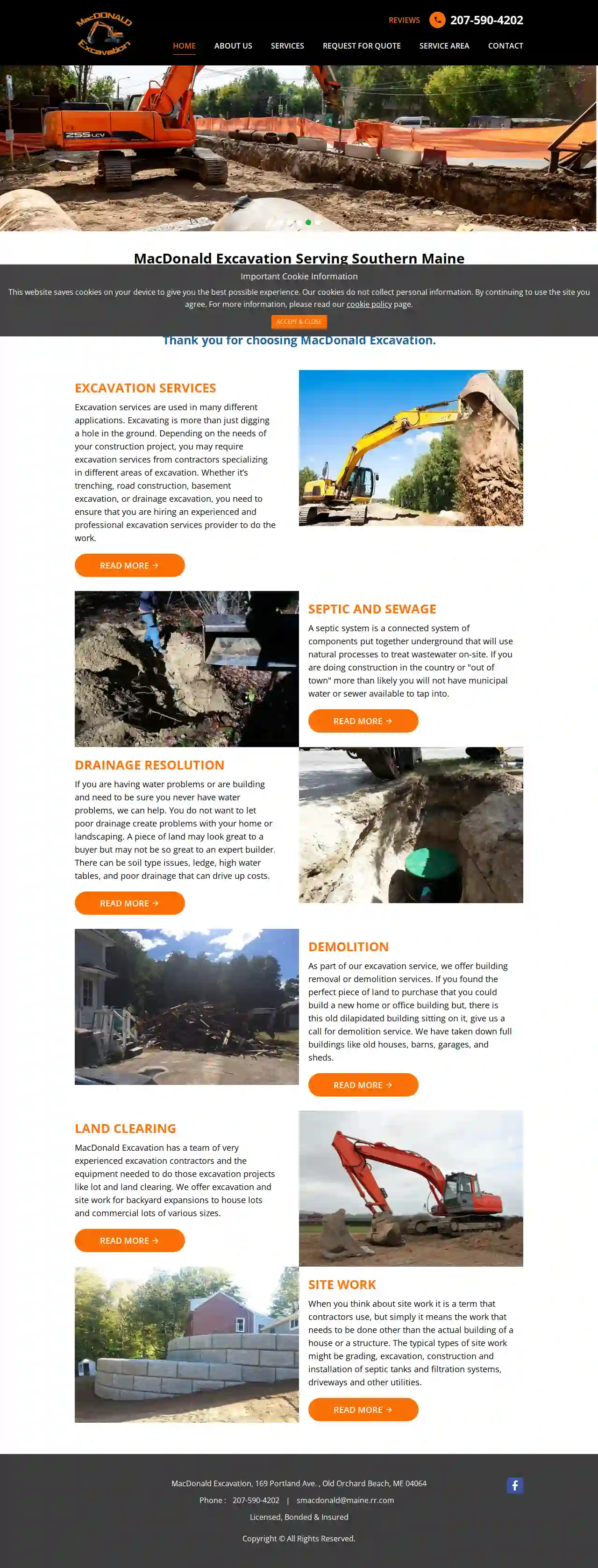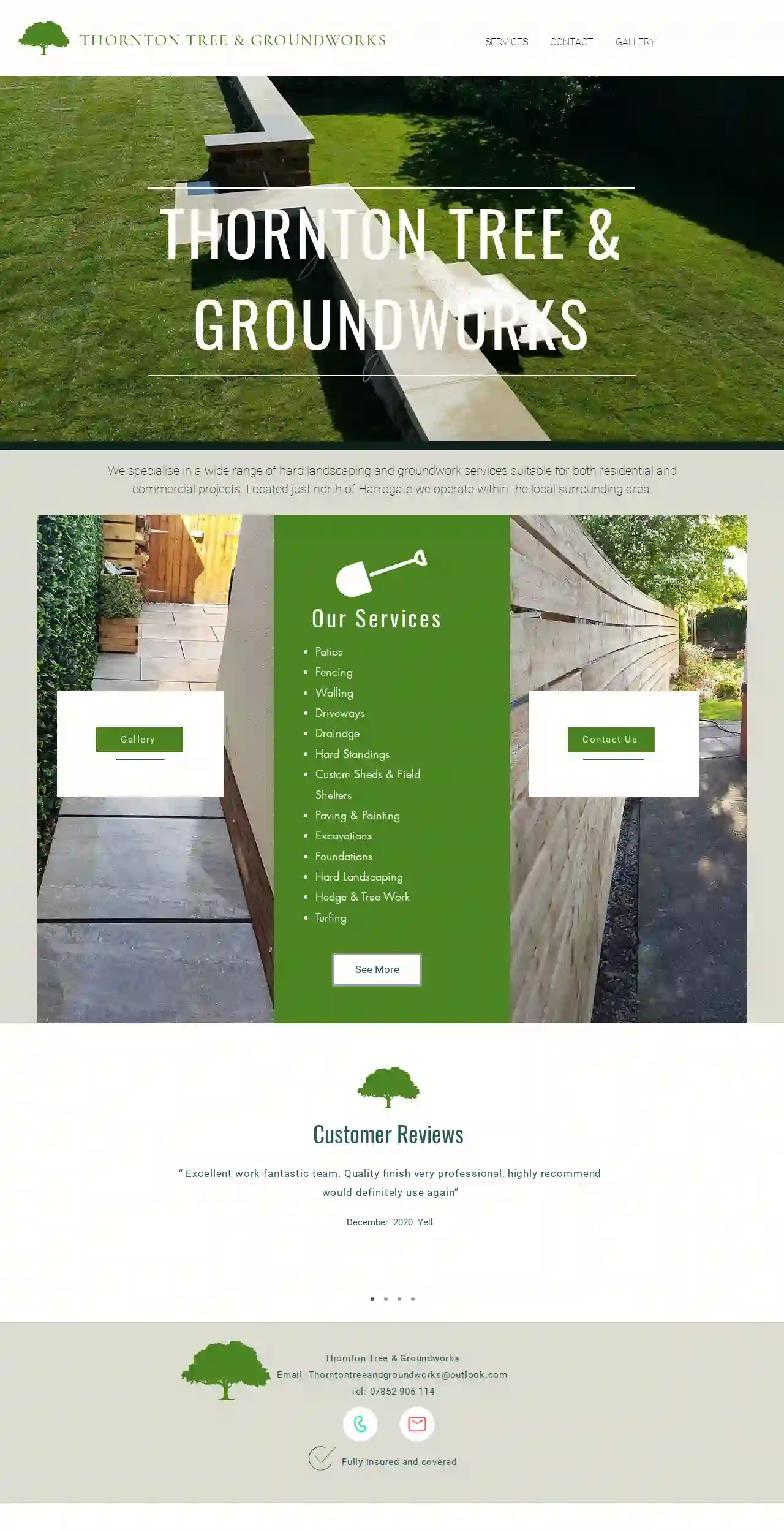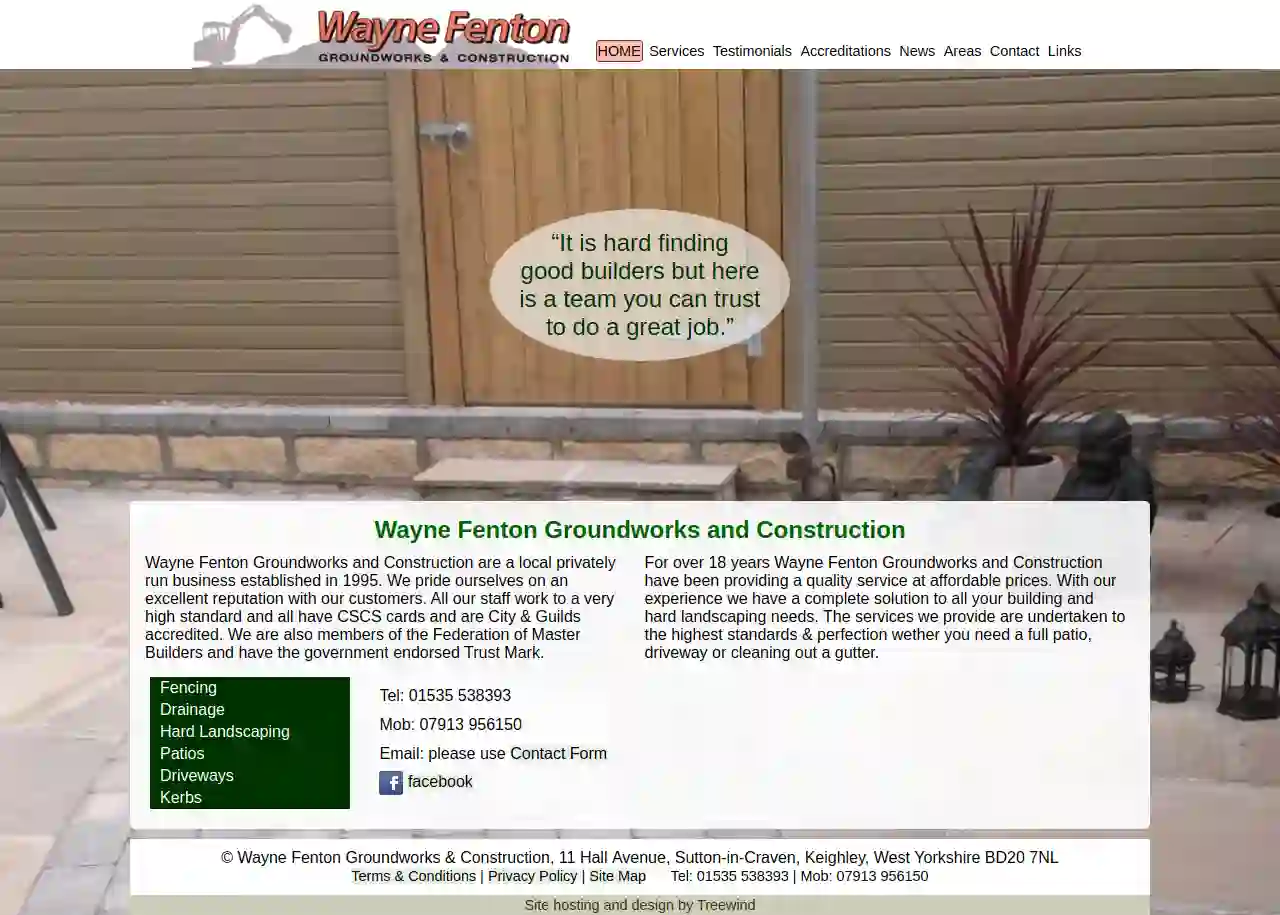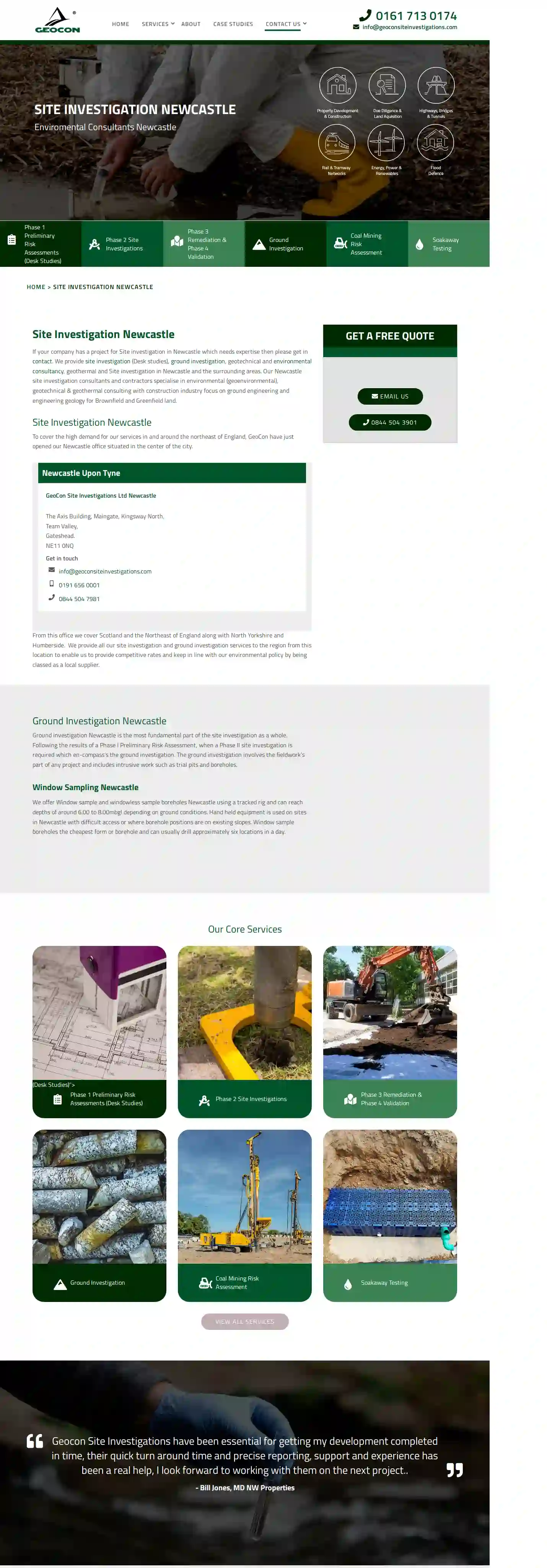Excavation Contractors Morpeth
Find top Land Excavation in Morpeth
Receive up to 3 Excavation Contractors quotes for your project today! Compare profiles, reviews, accreditations, portfolio, etc... and choose the best offer.

Diamond Drainage & Groundworks
4.650 reviewsUnit 1 Stephenson Court, Skippers Lane, Middlesbrough, TS6 6UT, GBDiamond Drainage & Groundworks: Your Local Experts for All Your Drainage and Groundwork Needs Diamond Drainage & Groundworks is a trusted local company serving the North East of England. We specialize in providing high-quality drainage and groundwork services for both residential and commercial clients. Our team of experienced professionals is dedicated to delivering exceptional service at competitive prices. Why Choose Diamond Drainage & Groundworks? 24/7 Emergency Callouts: We understand that drainage issues can arise at any time, so we offer a free emergency callout service, available 24 hours a day, 7 days a week. Fast and Efficient Service: We strive to provide prompt service, with most callouts completed within the hour. Competitive Pricing: We offer transparent pricing and are committed to beating any like-for-like quotation. Guaranteed Workmanship: All our work is fully guaranteed, giving you peace of mind. Friendly and Reliable Team: Our team is known for their reliability, friendliness, and tidiness. Local Expertise: As a local company, we understand the unique challenges of the North East and are committed to providing tailored solutions. Our Services We offer a comprehensive range of drainage and groundwork services, including: Drainage Services: Toilet unblocking, sink unblocking, external drain unblocking, drainage installation, high pressure drain jetting, CCTV drain inspection, soakaways, manhole inspection & repair, drain repair, land drain, septic tanks. Groundwork Services: Residential & commercial, ground stabilisation, reinforced concrete works, retaining walls & service yards, Section 278 highway works, block paving and slabbing, parking areas, resin driveways & walkways, demolition, specialist plant hire, all insurance work undertaken.
- Services
- Why Us?
- Gallery
Get Quote
Clear Gardens - Landscape Gardeners Hull
4.421 reviews14 Aberford Walk, Hull, HU9 5EN, GBOur History Established in 1997, Clear Gardens has been providing all types of Landscape Gardening services to Hull and the East Riding of Yorkshire for over 20 years. We are a small, fully qualified and experienced team of professionals, undertaking all types of gardening contracts, whether it's a patch of grass being turned into a driveway or a rickety old fence being replaced with quality treated timber. We can help you. We've been called "The Best Gardeners in Hull" - contact us today to find out why! How we work We work from start to finish to ensure our customers are happy with the project and in control the entire time. We offer a wide range of services to both commercial and residential customers.
- Services
- Why Us?
- Gallery
Get Quote
Anthony & Graham Chaplow Landscaping Ltd
513 reviewsKendal, GBAbout Chaplow Chaplow is a family-run business with over 20 years of experience in the landscaping and groundworks industry. We are based in Kendal, Cumbria, and we serve the surrounding areas. We are passionate about creating beautiful and functional outdoor spaces that our customers can enjoy for years to come. We offer a wide range of services, including: Driveways Gardens Groundworks Landscaping Patios Resin Bonded Sleepers Walling We are committed to providing our customers with the highest quality workmanship and customer service. We are also fully insured and accredited, so you can rest assured that your project is in safe hands. If you are looking for a reliable and experienced landscaping and groundworks company, then please get in touch with us today. We would be happy to discuss your project and provide you with a free, no-obligation quote.
- Services
- Why Us?
- Gallery
Get Quote
MacDonald Excavation, Excavating Contractors in Cumberland & York County
51 reviews169 Portland Ave., Old Orchard Beach, 04064, GBMacDonald Excavation Serving Southern Maine MacDonald Excavation is a full-service excavation contractor providing residential excavation services and commercial excavation services to southern Maine for over 25 years. With our expert excavation experience, we service homeowners, contractors, builders and towns to provide the skill needed for small yard projects to larger projects that require licensing, bonding and safety regulations. Thank you for choosing MacDonald Excavation.
- Services
- Why Us?
- Gallery
Get Quote
Paving solutions group
4.958 reviews51 Hunters Court, Gosforth, Newcastle, NE3 1SP, GBWelcome to Paving Solutions Group We are driveway and patio specialists working on domestic & commercial projects based in Newcastle Upon Tyne with over 20 years experience in the industry. Over 25 years of Experience Paving Solutions Group came into being when we recognised the need for better practice and service within the paving sector. From the very beginning, it has been important to us to complete our work to the very highest of standards so that our customers are 100% satisfied each and every time. With competitive quotes and a 10 Year Warranty for your purchase, what have you got to lose? Winner For The Best Driveway Service in Newcastle Upon Tyne 2024 The Quality Business Awards recognises businesses that achieve an average quality score of 95% or greater over the previous 12 months. UK businesses that have won a Quality Business Award represent less than 1% of registered businesses in the UK. This is the seal of quality that a business has achieved an overall quality score of 95% or greater.
- Services
- Why Us?
- Testimonials
- Gallery
Get Quote
Thornton Tree and Groundworks
511 reviewsHarrogate, GBThornton Tree & Groundworks We specialize in a wide range of hard landscaping and groundwork services suitable for both residential and commercial projects. Located just north of Harrogate, we operate within the local surrounding area. Our team is dedicated to providing high-quality workmanship and exceptional customer service. We take pride in our attention to detail and commitment to delivering projects on time and within budget. Whether you're looking to create a stunning new patio, install a beautiful fence, or simply need some general groundwork done, we have the expertise and experience to get the job done right. Contact us today for a free consultation and let us help you bring your landscaping dreams to life.
- Services
- Why Us?
- Testimonials
- Gallery
Get Quote
Pipeline Drainage Solutions
4.970 reviews9 Acton Road, East Denton, Newcastle upon Tyne, Tyne and Wear, NE5 2AL, GBBlocked Drain Specialists in Newcastle upon Tyne Welcome to Pipeline Drainage Solutions, a family-run business providing drainage solutions to homes and businesses. We work hard to clear blocked drains in Newcastle. Based in Newcastle upon Tyne but also servicing the Sunderland and Durham areas, we provide a same-day service at your earliest convenience with no hidden charges or fees. Get in touch today for a service that can’t be matched anywhere else! Value For Money Our prices start from just £85. There are no hidden charges, just an expert service at a great price. Tried & Trusted With a rating of 5/5 on Yell.com and 10/10 on Checkatrade.com, recommendations make-up a lot of our business. Find out why we're trusted by so many. 24 Hour Callout Available If you have an emergency, we're available 24 hours a day, 7 days a week. We don't charge for call-outs, just our services.
- Services
- Why Us?
- Our Team
- Testimonials
- Gallery
Get Quote
Excavate888 Mini Excavations Newcastle
4.822 reviews123 Main Street, Melbourne, 3000, GBExcavate 888: Your Trusted Excavation Partner Excavate 888 is a leading excavation company in [City, State], Australia, dedicated to providing high-quality excavation services for residential, commercial, and industrial projects. We are a team of experienced and skilled professionals committed to delivering exceptional results on time and within budget. Our commitment to safety, quality, and customer satisfaction has earned us a reputation for excellence in the industry. We utilize state-of-the-art equipment and techniques to ensure efficient and precise excavation work, minimizing disruption and maximizing efficiency. Whether you need site preparation, trenching, foundation excavation, or any other excavation service, Excavate 888 is your reliable partner. We work closely with our clients to understand their specific needs and provide tailored solutions that meet their expectations. Contact us today for a free consultation and let us help you bring your project to life.
- Services
- Why Us?
- Testimonials
Get Quote
FENTON GROUNDWORKS
51 reviews11 Hall Avenue, Sutton-in-Craven, Keighley, West Yorkshire, BD20 7NL, GBWayne Fenton Groundworks and Construction Wayne Fenton Groundworks and Construction is a local, privately run business established in 1995. We take pride in our excellent reputation with our customers. All our staff work to a very high standard, hold CSCS cards, and are City & Guilds accredited. We are also members of the Federation of Master Builders and have the government-endorsed Trust Mark. For over 18 years, Wayne Fenton Groundworks and Construction has been providing a quality service at affordable prices. With our experience, we offer a complete solution to all your building and hard landscaping needs. Whether you need a full patio, driveway, or gutter cleaning, our services are undertaken to the highest standards and perfection.
- Services
- Why Us?
- Accreditations
- Testimonials
- Gallery
Get Quote
GeoCon Site Investigations Newcastle-Upon-Tyne
The Axis Building, Maingate, Kingsway North, Team Valley, Gateshead., Gateshead, NE11 0NQ, GBSite Investigation Newcastle If your company has a project for Site investigation in Newcastle which needs expertise then please get in contact. We provide site investigation (Desk studies), ground investigation, geotechnical and environmental consultancy, geothermal and Site investigation in Newcastle and the surrounding areas. Our Newcastle site investigation consultants and contractors specialise in environmental (geoenvironmental), geotechnical & geothermal consulting with construction industry focus on ground engineering and engineering geology for Brownfield and Greenfield land. Newcastle Upon Tyne To cover the high demand for our services in and around the northeast of England, GeoCon have just opened our Newcastle office situated in the center of the city. GeoCon Site Investigations Ltd Newcastle The Axis Building, Maingate, Kingsway North, Team Valley, Gateshead. NE11 0NQ From this office we cover Scotland and the Northeast of England along with North Yorkshire and Humberside. We provide all our site investigation and ground investigation services to the region from this location to enable us to provide competitive rates and keep in line with our environmental policy by being classed as a local supplier.
- Services
- Why Us?
- Gallery
Get Quote
Over 13,059+ Excavation Contractors on our platform
Our excavation contractors operate in Morpeth & surroundings!
ExcavationHQ has curated and vetted the Best Excavation Contractors arround Morpeth. Find a top & reliable contractor today.
Frequently Asked Questions About Excavation Contractors
- Trench Collapses: Unstable trench walls can cave in, posing a severe risk to workers. Proper shoring and sloping are crucial safety measures.
- Utility Damage: Striking underground utilities (gas, water, electric) can cause leaks, explosions, or electrocution. Accurate utility locates and careful digging are essential.
- Falling Objects: Materials or equipment falling into excavations can injure workers. Securing work areas and using appropriate safety gear is vital.
- Equipment Accidents: Operating heavy machinery involves risks of rollovers, collisions, or mechanical failures. Trained operators and proper equipment maintenance are critical.
- Environmental Hazards: Excavated soil might contain hazardous materials (asbestos, lead). Proper testing and disposal procedures are necessary.
- Mechanical Excavation: Utilizing heavy equipment like excavators, backhoes, bulldozers, and loaders, suitable for most projects.
- Hand Excavation: Using hand tools (shovels, picks) for smaller excavations or delicate work near utilities.
- Blasting: Employing explosives to break up rock or hard materials, typically for large-scale projects.
- Hydro Excavation: Using high-pressure water jets to loosen and remove soil, often used for locating utilities or delicate excavation.
- Vacuum Excavation: Employing a vacuum system to suck up excavated material, suitable for safe excavation near utilities or in confined spaces.
- Excavations Deeper Than a Certain Depth: This varies by jurisdiction, usually around 5 feet.
- Excavations Near Utilities: Digging near buried utilities (gas, water, electric) often requires permits and utility locates to prevent damage.
- Excavations Affecting Public Property: Projects impacting sidewalks, roads, or other public areas typically require permits.
- Excavations in Environmentally Sensitive Areas: Projects in wetlands, floodplains, or other sensitive areas might need special permits.
What is the difference between topsoil and subsoil?
Topsoil: The uppermost layer, typically rich in organic matter, nutrients, and microorganisms. It's essential for plant growth and is often darker in color.
Subsoil: The layer beneath the topsoil, containing less organic matter and generally denser. It provides support for roots but is less fertile than topsoil.
During excavation, topsoil is often removed and preserved separately for later use in landscaping, while subsoil is typically used for backfilling or other less demanding applications.
What are the risks associated with excavation?
What are the different methods of excavation?
Do I need a permit for excavation?
What is the difference between topsoil and subsoil?
Topsoil: The uppermost layer, typically rich in organic matter, nutrients, and microorganisms. It's essential for plant growth and is often darker in color.
Subsoil: The layer beneath the topsoil, containing less organic matter and generally denser. It provides support for roots but is less fertile than topsoil.
During excavation, topsoil is often removed and preserved separately for later use in landscaping, while subsoil is typically used for backfilling or other less demanding applications.
What are the risks associated with excavation?
- Trench Collapses: Unstable trench walls can cave in, posing a severe risk to workers. Proper shoring and sloping are crucial safety measures.
- Utility Damage: Striking underground utilities (gas, water, electric) can cause leaks, explosions, or electrocution. Accurate utility locates and careful digging are essential.
- Falling Objects: Materials or equipment falling into excavations can injure workers. Securing work areas and using appropriate safety gear is vital.
- Equipment Accidents: Operating heavy machinery involves risks of rollovers, collisions, or mechanical failures. Trained operators and proper equipment maintenance are critical.
- Environmental Hazards: Excavated soil might contain hazardous materials (asbestos, lead). Proper testing and disposal procedures are necessary.
What are the different methods of excavation?
- Mechanical Excavation: Utilizing heavy equipment like excavators, backhoes, bulldozers, and loaders, suitable for most projects.
- Hand Excavation: Using hand tools (shovels, picks) for smaller excavations or delicate work near utilities.
- Blasting: Employing explosives to break up rock or hard materials, typically for large-scale projects.
- Hydro Excavation: Using high-pressure water jets to loosen and remove soil, often used for locating utilities or delicate excavation.
- Vacuum Excavation: Employing a vacuum system to suck up excavated material, suitable for safe excavation near utilities or in confined spaces.
Do I need a permit for excavation?
- Excavations Deeper Than a Certain Depth: This varies by jurisdiction, usually around 5 feet.
- Excavations Near Utilities: Digging near buried utilities (gas, water, electric) often requires permits and utility locates to prevent damage.
- Excavations Affecting Public Property: Projects impacting sidewalks, roads, or other public areas typically require permits.
- Excavations in Environmentally Sensitive Areas: Projects in wetlands, floodplains, or other sensitive areas might need special permits.